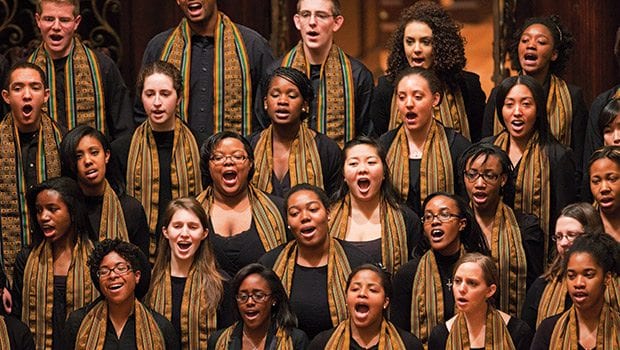‘Praise His Name’
Kuumba Singers of Harvard College give annual Christmas Concert

Performing at Harvard University’s Memorial Church last Friday night, the Kuumba Singers of Harvard College got down to their urgent business right away.
The choir began its 45th Annual S. Allen Counter Christmas Concert, entitled “Praise His Name” with a brief and searing speech. Jalem Towler ‘15 stepped up to the microphone and, invoking victims of gun violence and terrorist acts from Sandy Hook to Charleston, Paris and San Bernardino, exhorted the slain and their loved ones to “Rest in peace and power.”
“This is a public service announcement,” Towler proclaimed, “do not be afraid.” Quoting Bible passages that assert the kinship of all humanity as creatures of God, he concluded,
“So we will praise Him. Praise His Name!”
Then the 72-member choir let loose with a commanding delivery of “Anthem of Praise,” a contemporary gospel composition by Richard Smallwood.
In their two-hour concert, the Kuumba Singers demonstrated that when it comes to suffering — and resilience — black culture and praise traditions are second to none in their power to elevate, heal and set things right.
Inviting all to take part, Kuumba Singers Director Sheldon K. X. Reid told the capacity audience of almost 1,000 at the first of two concerts last weekend, “Please don’t hold back.”
Dedicated to Dr. S. Allen Counter, Jr., director of the Harvard Foundation and an abiding supporter of the Kuumba Singers, the concert is free to all, an annual event that Reid described as “our gift to the community.”
The choir did not hold back, performing a program that engaged all of the senses, from spoken word and song to dance. Demonstrating the black church tradition of oratory as well as music, in between songs, members of the chorus recited original poems and sermons that made the messages of suffering and redemption immediate and personal, here and now.
Lyrical joy
Lauren Fields ‘14 read her poem “I am Tired,” a psalm-like lament that concluded, “I will not be tired for long.” Marcus Granderson ‘18 acknowledged the endurance of suffering as well as resilience in his poem, “Hallelujah Anyhow.” In “Rain,” Ryan Boyland ‘17 voiced devastating grief over the death of a beloved teacher and concluded, “Sometimes even angels cry.”
Complementing these intimate testimonials was the communal give-and-take of the entire ensemble, whose members, primarily black Harvard undergraduates, also represented more than one generation and race.
Starting with Towler’s prelude, these orations were the spine of the program and song was its mainstay. The choir sang 15 traditional and contemporary spirituals that included two hymns in the African languages of Yoruba and Igbo. Selections varied in tempo and tone, moving from tenderness to thunder and from yearning laments to surging propulsive passages — often within the same song.
Orchestrating the choir’s deep bass lines, tight harmonies and driving percussive power, arrangements varied from creating a tidal force of voices raised in unison to the complex layering of diverse, intertwined vocalizations —both the pride of the gospel tradition.
Accompanying the choir was a 16-piece band with brass, woodwinds, guitars, keyboards, drums and bass.
Not just a celebration in sound, the concert also provided inspiring spectacle, from the entrance procession of the singers down the central aisle of the grand church singing, swaying and clapping, to their attire — black gowns with sienna-toned stoles of kente cloth.
Gestures matter in stage performance, and among the subtle but telling ways that the Kuumba Choir presents itself is its decorum of modesty and mutual support. For example, after delivering an impassioned solo, a singer would without fanfare return to the ensemble and once there, receive a warm embrace.
Reid introduced a guest soloist, local educator and musician Genithia Hogges. A small woman with a giant voice, Hogges sang the old hymn “Give Me Jesus” to an arrangement by Hall Johnson (1888-1970). Backed by spare piano accompaniment, Hogges began with a tender solo that filled the hushed church and then, joined by the full chorus, her voice soared to the hymn’s rousing finale.
Deep strokes from a large drum accented the rendering of a Nigerian Christmas carol, “Betelehemu,” by Babatunde Olatunji (1927-2003) and Wendell Whalum (1931-1987), longtime director of the Morehouse College Glee Club. Wearing kente cloth tunics and black leggings, eight singers took to the aisle, dancing with ferocious energy as the chorus sang, ululated and clapped in an exuberant, multisensory ode to joy.
“Mary Did You Know?” as arranged by Reid, became a lovely a capella performance that combined a bit of scat with stretched-out, elongated words, the better to ponder the wonder in the hymn’s sweet and simple conversation with Mary. Another complex a capella delight was the choir’s rendition of “Silent Night,” in an arrangement by contemporary vocal group Pentatonix.
Drawing from a repertoire of sacred music that spans centuries, the program included such familiar hymns as “O Come All Ye Faithful” and Handel’s Hallelujah Chorus.
The concert was a thrilling demonstration of the power within the time-tested form of gospel music to encompass and sanctify the full spectrum of human experience—including grief, anger and joy.
Following the intermission, the chorus returned clapping and swaying to the irresistible groove of “Stranger” by Donald Lawrence, whose North Carolina-based Tri-City Singers made the song a big hit, with its portrait of Jesus as a man in a small town who heals the sick and multiplies loaves and fishes to feed all. As they took their places on the platform, they kept dancing, zigzagging back and forth and clapping to the beat in wild elation.
In a program that mingled the old and the new, the Kuumba Singers concluded their concert with an a capella song of benediction.






